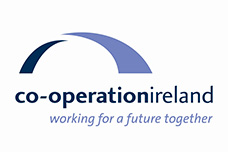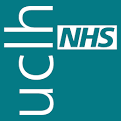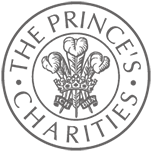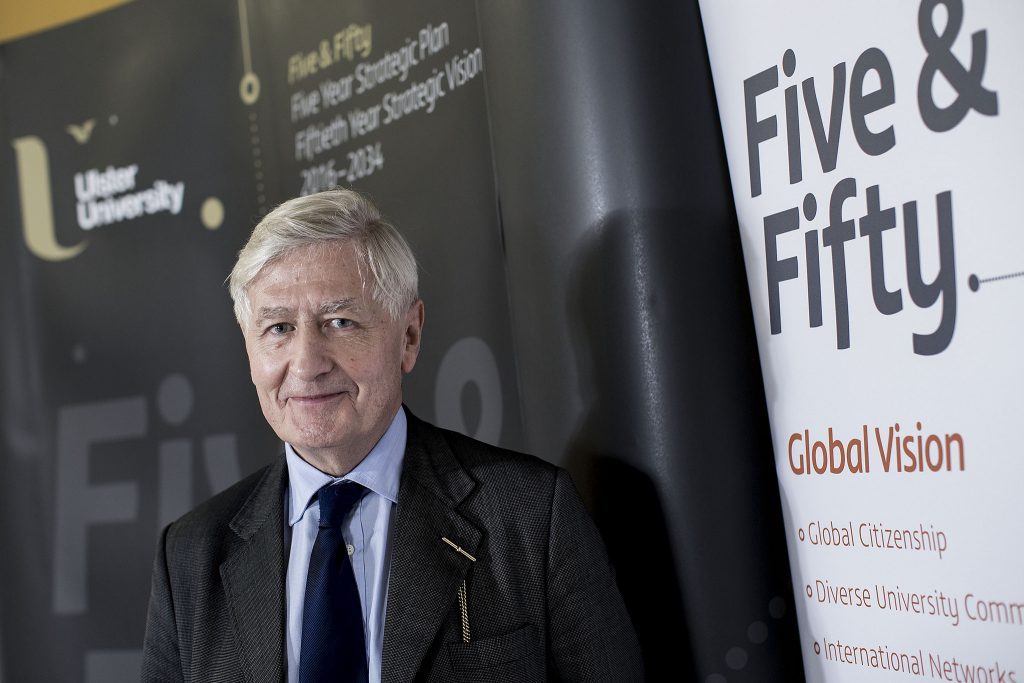
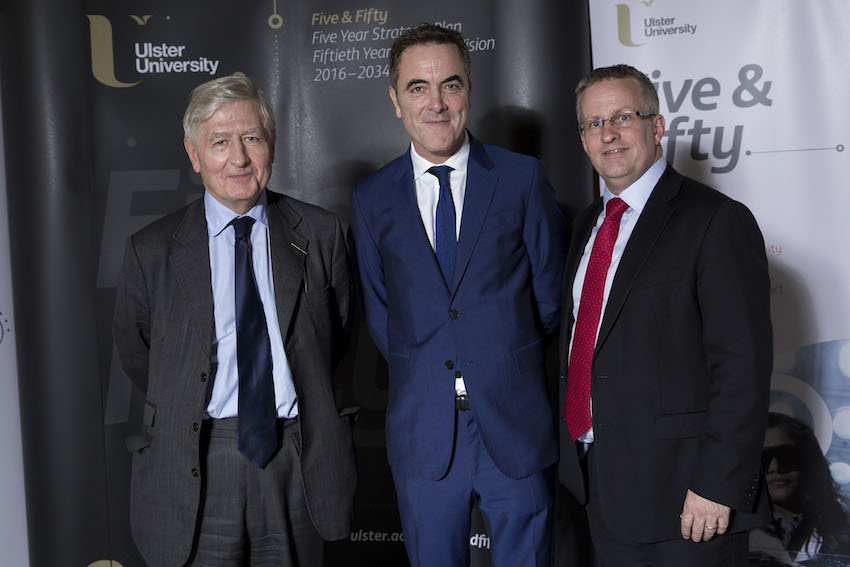
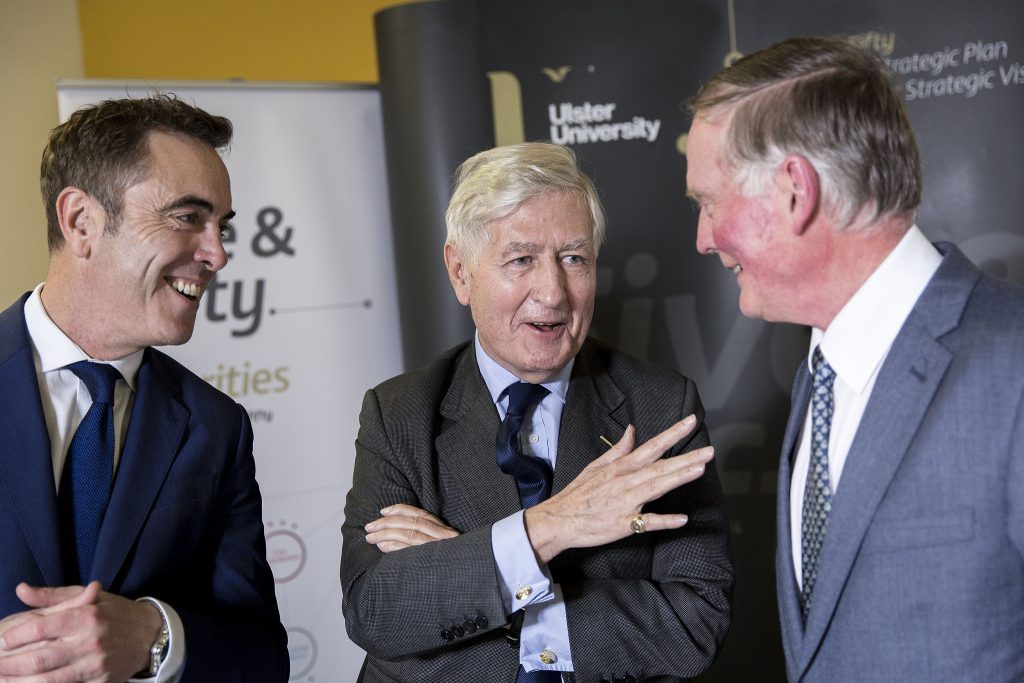
Remarks by Dr. Christopher Moran, Chairman, Co-operation Ireland, Ulster University
Chancellor, Vice Chancellor, Minister, distinguished guests, ladies and gentlemen, it is a huge privilege for me to be amongst you today. It is also slightly intimidating because I guess like the poet Pat Kavanagh said we are all ‘grabbing an education late’ on events which are changing around us. Nevertheless thank you for the invitation.
It is not an over simplification to say that here in the western hemisphere we have witnessed more political upheaval in the past five months than in the past fifty years.
And whilst I discuss elements of this upheaval later, its fair to say that the fallout in terms of change whether politically, economically or socially will have profound implications for everyone on these islands but in particular for Anglo-Irish relationships- East- West, North-South and between communities in Northern Ireland.
Universities like other organisations will be directly impacted by some of these changes in terms of finance, policy, organisation, recruitment and outputs but also in terms of their relationships to government, business and local communities.
Now being amongst such an august and accomplished assembly of academics, senior politicians, policy makers, researchers and business people, you may have expected me to delve into my library for something inspiring from the works of Plato, Tennyson or even your own Seamus Heaney, but no instead I found myself drawn to the lyrics of the new Nobel Laureate for Literature, Bob Dylan, not a natural choice I know but appropriate for my theme today.
In one of his most celebrated songs, ‘Times are a changing,’ he wrote:
‘Come writers and critics
Who prophesise with your pen
Keep your eyes wide
The chance won’t come again
And don’t speak too soon
For the world’s still in spin’
In some ways it is easy to see how Dylan in a song with his keen observations on societal change that’s now over fifty years old – has been given the Nobel prize- its lyrics are as appropriate now as they were back then. Indeed it does seem as if the current world is in a spin as people try to interpret international and domestic events from Brexit to the unrest caused by Isil, from President Elect Trump to the expanding reach of President Putin. But as Dylan the poet says – ‘Don’t speak too soon.’
Yes, the world we live in is full of uncertainty, challenge and change. Notwithstanding that- there are opportunities and every generation or so we do go through change- seismic change- and you know what -we survive it.
For those of us who remember only too well the 1960’s, it was a time of great change and upheaval, a time of optimism and colour, a time tainted with fear too as the cold war cast a long shadow, it was a time of technological change, changing fashions and music- it was a time of momentous man-made achievements such as walking on the moon and it was a time for doing new things in a new way by a new generation.
What strikes me most of all about that era, given that I am now what marketers like to call part of the so called Baby Boomer generation, was the sense of optimism. Remember those baby boomers included pioneers such as Steve Jobs, Bill Clinton, even David Bowie and Bono!
Of course, there was apprehension but it never overwhelmed us. The drab and black and white world of the post war generation was being swept away on a tide of change. Yes it meant changes in the labour market but those were embraced. It meant change in our leisure and it meant change too, in terms of equality. But most important of all there was a new found air of confidence amongst young people and as hard to imagine now, I was also young then, we were keen to embrace change and get on with life! Nothing seemed impossible and nothing seemed beyond our reach. It was a time when change meant challenge and challenge presented opportunities.
It was in the 1960’s that the late American President JF Kennedy pointed out that ‘’when written in Chinese, the word “crisis is composed of two characters. One represents danger and the other opportunity.” Whether or not we always see the opportunity is entirely another thing. But his point was there is opportunity in all things if we look for it.
And it was the same JFK who said “We can only have faith in the future if we have faith in ourselves”
And that Ladies and Gentlemen is the thrust of my comments to you today. Are we brave enough to believe in ourselves?
Frankly we have to, because if we have faith in ourselves, in our collective abilities and capacities to meet head on the challenges and opportunities that now present themselves- we will succeed.
Who seriously would have thought that within a very short period time that NI would have the DUP and Sinn Fein sharing power and that NI would also have a functioning Opposition? Its not life as we once knew it in Northern Ireland.
They say politics only trades in two commodities – hope and fear. Well, let me assure you today – I am very much in the business of hope. And I am firmly committed to the view that investment in education gives us the best return on the social capital that is our young people.
As Chairman of Co-operation Ireland, I understand more than others, the need to have faith during the most difficult of circumstances and sometimes with the most difficult of people. I also understand how we must develop leadership within communities at a grass roots level as well as nurturing and reinforcing positive political leadership where and when we can.
I realise that five months ago during the referendum on EU membership- that the debate – very much like the recent US Presidential election- often took a downward turn, degenerating into undignified spats. I know that fear drove both sides and both used and misused sparse facts like ammunition aimed at maiming each other rather than informing.
And frankly I regret that the tenor of the debate has left deep wounds and divisions on all sides throughout the UK. One commentator said it was like a Civil war without the swords and the be-headings. Personally speaking I wish the debate had taken place in a calmer atmosphere.
Taking the decision to leave membership of the EU was a huge step and yes there is still considerable uncertainty as to the future- but the people have given their verdict and there is no going back.
But we have a choice about how to address what has happened and it’s the old simple one- we can look at our glass half full or half empty. By my nature I am the glass half full type.
Universities I recognise had and have particular concerns as to how Brexit would impact on them. Those concerns were widely articulated across the sector and were in some cases very legitimate.
International collaborative research is hugely important to British universities and of course to British industry. Higher education receives about 15% of its income from the EU and therefore has a degree of uncertainty over any funding gaps. Particular issues arose over the hugely popular Erasmus programme through which some 200,000 British students have participated in – including many thousands of students from here in Northern Ireland.
Of course there is a worry too that EU students may no longer opt for British universities if their fees were to become substantially higher.
But the decision is now made and the UK is bound to the will of the electorate- as the Prime Minister has made clear- ‘Brexit means Brexit.’
This I know is particularly difficult here in Northern Ireland where a clear majority voted to Remain. If there are ways to mitigate against the impact of Brexit on local businesses such as agri-businesses- I have no doubt that institutions like Ulster will be to the fore of any innovative solutions.
I believe that the University participated in the Taoiseach’s initiative in Dublin a few weeks ago and I am sure that for your institution this is one way of maintaining relationships with key academic and government counterparts across the island.
A recent article I read by Dame Julia Goodfellow, President of Universities UK and Vice chancellor of the University of Kent, struck me rather forcibly.
In the article Dame Julia wrote, “The vote to leave the EU was not one we wished for, but we must now work to address the significant and immediate challenges for universities, and identify the opportunities.”
Dame Julia quite rightly points out that change will not happen over night and that assurances and clarity must be given to the 125,000 EU students already in our higher education system. And let’s not forget the 43,000 staff working in Higher Education from EU countries too whose expertise we can ill afford to lose. We all recognise the significance of their contribution and that learning and knowledge sharing knows no boundaries or borders.
Ulster, along with Queens I would respectfully suggest should work closely with the NI Executive to create a platform which is then integrated into any Brexit strategy being prepared for Higher Education by the national government as its unlikely that the Executive alone could underwrite funding gaps in the near future.
The loss of any EU students may provide opportunities for more local students to get places in universities. In my own view, the world-class research produced here and at other British universities will still enable places like Ulster to attract the best of students from across the globe. And indeed, if proof is needed, then this university is already an exemplar of how to successfully market to the Middle East and Far East over recent years.
With great insight Dame Julia, like me, believes that universities have a central role to play in responding to the wider social challenges of the referendum decision.
Specifically she says, “ Domestically, universities will use their strengths as civic leaders to help address the fractures and divisions that the referendum campaign revealed.”
I think that there is particular merit in this role becoming more significant –especially by leading on issues such as tolerance, diversity, social division and a sense of internationalism. And nowhere lies more expertise in these fields than at the Ulster University.
The outreach by Ulster has been simply amazing, especially to people from within marginalised communities here in Northern Ireland, where you have imaginatively and positively engaged. You have proven that this institution is no ivory tower beyond the realities of everyday life in Northern Ireland. In a world seemingly obsessed with ‘elites’ your doors remain open to all –so don’t lose that.
When I have looked at some of your programmes on outreach I am minded of a quote from one of the former owners of Crosby Hall –Sir Thomas More- when he said –“How can anyone be silly enough to think of himself better than other people, because his clothes are made of finer woollen thread than theirs. After all, those fine clothes were once worn by a sheep, and they never turned it into anything better than a sheep.”
As Chairman of Co-operation Ireland, I am acutely aware of the role that this university has played in developing community relations, peace building programmes and training of the new police service. I am also aware of the university’s role in developing the Peace Chair at Magee and its links to Harvard through your Real Estate Initiative.
That this university looked Westward for collaboration is significant -particularly given that the USA is the largest single foreign investor in both Northern Ireland and the Republic of Ireland.
So, as a public servant and a businessman with many trans Atlantic connections I would encourage you to build further on those links.
A further role in the future for universities like Ulster is in partnering more with government but particularly with local government. City Councils, in particular have a vested interest in seeing effective partnerships with universities, not just in attracting much needed inward investment but also as a civic resource, which do local communities trust.
A recent report by the University of Newcastle says that, ‘The location of a university often helps form its unique identity as an institution giving a sense of place to its stakeholders.’
I would invite to you look at what your forward planning here in Belfast has done and can only imagine what a central cog this institution will be here in the heart of Belfast- now that you have this iconic building. You have given yourselves roots. And soon new relationships will emerge with local communities through the creation of jobs and with new types of digital entrepreneurs attracted to Belfast.
Over the years I closely watched the evolution of relationships between the UK and Ireland, Northern Ireland and the Republic of Ireland and within Northern Ireland. Those relationships have grown and strengthened year on year through many initiatives, which have had both symbolic and profound impacts on both islands, the university has developed some of these.
As we live in a world of continuing conflict and division I have no doubt that the expertise built up by this university can be shared right across the world and it is my belief that many international institutions will be lining up to do business with Ulster.
On the very point of conflict resolution I am more than aware that this University shares with Co-operation Ireland the deep desire to bring closure to the many Northern Ireland legacy issues which are still outstanding. Whilst we cannot be prescriptive on these matters –I am sure that we can agree that any future resolution should be victim centred and rooted in justice.
But as the Queen at Windsor Castle in 2015 said the greatest legacy from all the turmoil and heartache of the past is that which we can bequeath to our children and that’s to look ahead and concentrate on the future.
This university along with others can use their skills and talents in seeking to find innovative solutions and resolutions to the fallout from unresolved legacy issues. It won’t be easy but then path-finding never is- but it worth trying.
Those of us involved in the complex world of Anglo-Irish politics know that. It takes time to adapt to change whether it’s from the shadow of the Troubles, backsliding in the peace process or the fallout from Brexit.
However I am reliably informed that universities are very political places to work in- so perhaps some of our skills are transferable and we could learn from one another how to achieve mutually beneficial outcomes.
In my own experience change takes time and in my world and that of Co-operation Ireland the process is often loaded with setbacks and rewards in equal measure. One thing is certain though and that is amidst change – you can’t afford to stay still.
Co-operation Ireland has dramatically changed its focus and role over the years to match the actual changing dynamic not just of the evolving peace process but also the changes within NI society itself-just one of the reasons we now operate the National Citizen Service programme.
That said no one could underestimate the significance of the role played by the Queen during her State visit to Dublin and her reciprocal hosting of President Higgins at Windsor Castle. At a political level much credit is due to both Peter Robinson and Martin McGuinness for the personal risks they have taken in providing positive leadership for the entire community in Northern Ireland.
Credit too to is due to the successive Prime Ministers and Taoisigh who have kept the peace process and political developments on track for over twenty years. Sometimes you just have to make bold statements and take risks. I know that you Chancellor won’t shy away from those risks either.
So one of the things I want to emphasise here today is leadership- the importance of leadership at every level but particularly from the top.
And leadership has to come not just from within this university, there also has to be a practical response from within the EU too. The European Universities Association in a statement over the summer said- and its heartening to hear, ‘ British universities are- and remain- an essential part of the European family of universities, which extends beyond EU borders. This community knowledge is strong and long standing, and it will surely overcome this crisis. The Europe of universities will not be divided and we will continue to work with and for British universities.’
I think that this proves that if the will is there then there are solutions to issues, which may look like problems now. After all places of learning are supposed at the leading edge of problem solving.
With your permission Chancellor, I would like for a moment to reflect on where we are politically. It’s no secret at this juncture in the journey of Anglo-Irish relationships- there are new threats and obstacles that now present themselves as a result of the recent British referendum on EU membership.
It was Churchill who wrote in the aftermath of the First World War “the whole map of Europe has been changed. But as the deluge subsides and the waters fall short we see the dreary steeples of Fermanagh and Tyrone emerging once again.”
Now I know that the current First Minister, Arlene Foster may take issue with his description of the dreary steeples of her beloved Fermanagh but I am sure that she too agrees that when the deluge subsides from the Brexit fallout that a common priority is to ensure that the normality of Anglo-Irish and North/South relationships is maintained. Dreary steeples somehow have a welcome and settling effect whether in Fermanagh or Cavan.
Yet it would be foolish not to say that Brexit has changed everything not just the EU but Europe too. The greatest impact will be felt in the Republic of Ireland and Northern Ireland and particularly in border communities. It is our duty to mitigate against the negative fallout as best we can.
The very fact that the Republic of Ireland is likely to be affected more than any other country in the European Union and Northern Ireland will suffer collateral damage too- shows only too clearly how close the bonds between both islands really are and in a perverse way demonstrates the urgency for all concerned to foster ways of maintaining that closeness in the interests of people in Britain, Ireland and Northern Ireland.
And it appears there is a political will to do just that.
No one is in the business of re-establishing unnecessary barriers or borders because we know that once they exist then they can become more entrenched in the minds of some than in physical reality.
Obviously, the Brexit vote has brought some natural tensions to the fore, after-all the majority of Northern Ireland citizens voted remain in the referendum and the two parties of government -Sinn Fein and the DUP found themselves on opposite sides of the debate and the fallout from the vote to Leave the European Union.
Notwithstanding those differences it was heartening to see both the First and Deputy First Minister taking steps to present a united front to Prime Minister May to secure the best possible deal for Northern Ireland.
Equally positive are the remarks of the new Secretary of State, James Brokenshire and Irish Minister for Foreign Affairs, Charlie Flanagan on their common desire not to see hard borders within the island of Ireland and to maintain the Common Travel area between the UK and Ireland.
Now is not the time for disunity of approach and its incumbent on all of the parties in Northern Ireland whether in Government or Opposition to work together and not against one another.
I am not naive and I know that this will be difficult but as can be evidenced by the collective efforts which brought about the Good Friday, St Andrews and New Start Agreements it is something worth striving for together in the interests of everyone in these islands.
Only last week the determination to reflect the need for a public display of normalisation in Anglo-Irish relationships included the First and Deputy First Ministers, British Cabinet Ministers, along with the Irish Tánaiste, Opposition parties from NI and the Republic all gathered together at my home, Crosby Hall to attend the unveiling of a portrait of Her Majesty the Queen- joint patron of Co-operation Ireland.
The painting was executed by one of your own fine artists from the university’s art college- the talented Colin Davidson.
The occasion was symbolic, just like the first meeting between former President Mary McAleese and the Queen, incidentally also at Crosby Hall- just like the momentous visit by the Queen to the Republic of Ireland or the historic handshake between Martin McGuinness and the Queen at the Lyric theatre; or Peter Robinson addressing the GAA at Queen’s, or the memorable Reception and State dinner for President Higgins at Windsor Castle- all incremental steps taken slowly with considerable input from Co-operation Ireland.
That’s how one meets a changing dynamic and the universities should learn to adapt to their new environment by challenging and by always looking for new opportunities to cement its future.
As the Taoiseach Enda Kenny said on a recent visit to this university ‘If we have learnt anything on this island in recent years, it is that engagement is the way to a better future.’ This university has been playing its part in providing forums for such engagement and in or out of the EU -I am confident with the positive leadership of you – Chancellor and your team here at Ulster it will continue to do so.
Yet we live in uncertain times and the only certainty is how we decide to deal with that uncertainty, which means that none of us, involved in the furthering and strengthening of Anglo-Irish relationships can afford to be complacent. Let’s take control of what we can control and shape our future.
Of course some of what lies ahead in London, Brussels, Paris and Berlin is beyond our direct control so we must redouble our efforts to strengthen the bonds East-West and North/ South.
For my part and that of Co-operation Ireland with our on ground experiences of working within divided communities, our uniquely placed connections throughout these two islands and further afield in the USA and with the strategic acumen of our board, which includes former Taoiseach, John Bruton and former First Minister Peter Robinson and many others, we stand ready to help and facilitate any efforts which bring unity of purpose amongst the disparate voices over Brexit because we recognise that each in their own way is trying to find the best options for all the people of these islands.
The biggest threat, as I see it, post Brexit is the opening up of old wounds and divisions by those who would seek to exploit the situation. We are only too aware of dissident forces in the shadows that are only too willing to fill any vacuum, which may open up. However I am confident that will not be allowed to happen.
Yes Brexit has presented challenges unique to these islands but this is a time for steady nerves, temperate voices and a hearty measure of goodwill on all sides.
So finally Chancellor, as an optimist I would like to conclude by using words from a poet- Derek Mahon- born and bred in Belfast in the shadow of the ship yard which was very much part Belfast’s past and now is home to Titanic Belfast recently voted the most popular tourist destination in Europe.
Post Brexit his words are as applicable to anyone in Britain, Ireland, Northern Ireland and this university- ‘the sun rises in spite of everything and the far cities are beautiful and bright. I lie here in a riot of sunlight watching the daybreak and the clouds flying. Everything is going to be all right.’
Thank you.
// Link to Ulster University article: https://www.ulster.ac.uk/news/2016/november/dr-christopher-moran-delivers-the-annual-chancellors-lecture
